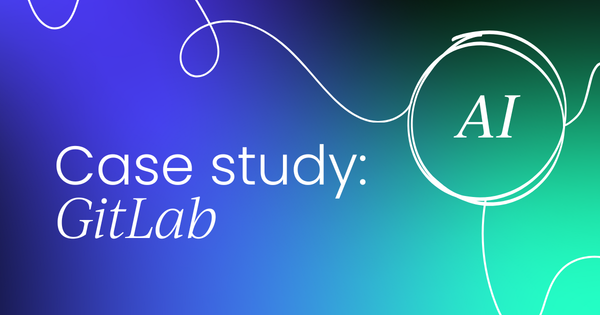GitLab: The devsecops platform winning the AIGitLab paradox
The shift to Generative AI has created a powerful paradox in software development: while coding is faster than ever thanks to AI assistants, the complexity of managing security, governance, and compliance across fragmented toolchains has created new bottlenecks. Global businesses now lose over seven hours per week per team member to these inefficiencies.
GitLab, the comprehensive DevSecOps Platform, is tackling this head-on. By unifying the entire software development lifecycle (SDLC) into a single, intelligent application powered by AI Agents, GitLab is not just accelerating coding - it's industrializing secure, compliant software delivery.
What GitLabUK has done for the UK in 2025
The UK's enterprise and public sectors are grappling with how to adopt AI while meeting strict financial and regulatory compliance demands. GitLab’s work in 2025 has been critical in demonstrating a path forward, particularly in highly regulated industries.
Key 2025 milestones in the UK:
- High-profile enterprise adoption: UK financial leaders, such as NatWest, publicly highlighted their deep adoption of GitLab Duo, GitLab's suite of AI agents. This demonstrated how a major bank uses the platform to integrate AI directly into their code review, test generation, and compliance workflows - a huge win for enterprise trust.
- Unlocking economic value: GitLab’s own research revealed that AI-enhanced software innovation has the potential to unlock over £5 billion in annual economic value across the UK by saving developers an estimated £11,000 per year through productivity gains. This data provides a crucial economic mandate for UK leadership to invest in unified DevSecOps platforms.
- DevSecOps leadership: For the third consecutive year, GitLab was named a Leader in the 2025 Gartner Magic Quadrant for DevOps Platforms, emphasizing its integrated approach over fragmented toolchains. Critically for the UK's regulated delivery sectors, GitLab ranked #1 in four out of six Gartner Critical Capabilities use cases, including Regulated Delivery.
This adoption signals a major trend: UK enterprises are moving away from managing a sprawl of separate tools (GitHub for code, Jira for planning, separate tools for security) toward a single platform that embeds governance and security from the first line of AI-generated code.
Global deployment strategy: Unified platform and agents
GitLab's strategy is built entirely around consolidating the fragmented DevSecOps market through two core pillars:
- The single platform advantage: Unlike rivals that rely on multiple integrations (e.g., Atlassian's Jira, Confluence, and Bitbucket stack), GitLab offers a single application for the entire SDLC - from planning, source code management, CI/CD, security, and monitoring. This dramatically reduces integration overhead, context switching, and, crucially, security gaps.
- Agentic AI orchestration: The core deployment focus in 2025 was the release of the GitLab Duo Agent Platform. This moves AI beyond simple code completion (like GitHub Copilot) to multi-step, autonomous agents that act proactively within the platform’s context. These agents can automatically triage vulnerabilities, generate full test suites, and perform compliance checks before code is merged.
This approach targets the "AI Paradox," ensuring that the speed gained from AI code generation isn't lost to friction in security and deployment pipelines.
Technical advantages over competitors in 2025
GitLab’s major advantage is its unified data model and AI Agents’ contextual awareness across the entire software development lifecycle (SDLC), differentiating it sharply from its main competitors:
GitLab's commitment to building security and compliance into the code itself using its unified data structure allows it to offer a higher level of automation and risk reduction than solutions that require separate tools to enforce policy.
What’s next for GitLab in 2026: Building compliance into code
For 2026, GitLab will focus on conquering the final frontiers of the AI paradox: compliance and full agentic autonomy.
- AI-native compliance: GitLab predicts that by 2027, 82% of compliance will be built into code and automatically applied. GitLab’s roadmap is focused on delivering the automated governance features needed to achieve this, allowing developers to scale their use of AI-generated code without risking catastrophic regulatory failure.
- Agent-to-agent collaboration: The Duo Agent Platform will evolve toward enabling sophisticated agent-to-agent workflows. Instead of a human asking an agent a question, agents will collaborate to resolve bugs, generate documentation, and manage security updates autonomously, with human oversight built into the final review stage.
- The platform engineering solution: The company will leverage its leadership in Platform Engineering - the practice of building reusable, internal development infrastructure - to provide blueprints that help enterprises orchestrate complex AI workflows safely, turning the platform engineering team into the internal supplier of AI agility.
Must-attend: The AI-native enterprise: Moving from pilot to production
How do you transition from using fragmented AI assistants to building a unified, scalable AI-native software delivery process? GitLab’s expert is coming to Generative AI Summit London to share the architectural and strategic insights needed to industrialize DevSecOps with AI.
Why you must attend:
This session is crucial for engineering executives in regulated industries:
- Solve the AI paradox: Understand how to reclaim the seven hours per week lost to toolchain fragmentation by adopting an integrated platform approach, maximizing the ROI of your AI investments.
- Security by design: Learn how to embed AI governance and security checks directly into your CI/CD pipelines using GitLab Duo agents, ensuring compliance is automated rather than handled as a costly afterthought.
- Strategic roadmap: Get direct insights into the future of Agentic AI and how to upskill your teams to evolve from developers into platform engineers who orchestrate the AI-native DevSecOps world.
Don't miss out on the blueprint for secure, high-velocity software delivery in the age of AI. Register for the Generative AI Summit London today.




 Follow us on LinkedIn
Follow us on LinkedIn
